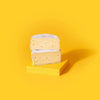Is cheese bad for you? The experts say no...
By Richard Simpson
Sep 4, 2023

Here at cheesegeek we have always known that cheese is magic. So we couldn’t have been happier to hear Tim Spector, Professor of Genetic Epidimiology at Kings College London, and Sarah Berry, Associate Professor, Department of Nutritional Sciences at Kings College London talking about the science behind why cheese is magic, supported by the largest in-depth nutrition study in the world (over 4 million participants!). The most definitive scientific evidence yet of the super powers hidden in artisan cheese.
What the experts are saying
Sarah says, “…yoghurt and cheese are a great part of our diet, they’re packed full of nutrients, calcium, iodine and potassium, and all the proteins our body can’t make…despite having high saturated fat content, they don’t increase our cholesterol”
“So that sounds a bit magic” says Jonathan Wolf, the interviewer, and co-founder of Zoe - the new personalised nutrition start-up taking the UK by storm.
We concur, Jonathan.
Cheese carries within it numerous nutrients that our bodies absolutely love. These include, but aren’t limited to, calcium, vitamin A, B2 and B12 - in every single mouthful!
Here are a few of the key benefits we can all get from eating cheese, as featured on a recent Zoe podcast featuring Tim and Sarah:
- Dairy consumption reduces Type 2 Diabetes
- If you have high cholesterol you should NOT give up dairy
- Evidence dairy consumption reduces cardiovascular disease
- Dairy consumption is associated with lower incidences of being overweight
- Care homes adding dairy to residents’ diets saw improvement in health outcomes
- Evidence dairy consumption reduces incidences of cancer – specifically colon cancer
- The most positively impactful form of dairy is fermented dairy (ie cheese and yoghurt)
- Probiotic microbes within fermented dairy are clinically shown to benefit the immune system
- These microbes energise other microbes in our gut, stimulating other beneficial metabolytes and chemicals
- Processed cheese doesn’t have these microbes
So, how should we go about adding cheese into our diet?
In his conversation with Zoe, Tim Spector had these great pieces of advice:
- “Small portions little and often”
- “Pick, if you can, artisanal cheeses. Processed cheeses are dead”
- “If you can get raw milk cheeses, do go for them as they have a broader range of microbes”
- “Try and get diversity of cheeses (for greater diversity of microbes)”
As a fermented food cheese is a probiotic heaven, with proven gut health benefits similar to that of kimchi, kombucha and kefir. And, as with other gut heroes, cheese can be approached in the same way - by adding small amounts into our regular diet.
How much cheese should I be eating?
Long story short, artisan cheese is great for your gut. Especially artisan cheeses made with raw milk such as Pitchfork, Vintage Lincolnshire Poacher or Spenwood.
And it gets better. Eating around 30g of cheese every day is, in fact, the most beneficial approach for your gut.
If you want to learn more about the nutritional benefits of dairy, the podcast above is well worth a watch...and you never have to feel guilty about getting your artisan cheese fix again.

